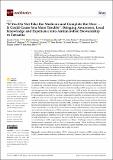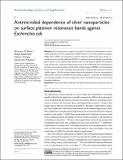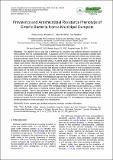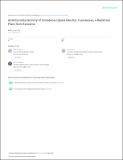“If You Do Not Take the Medicine and Complete the Dose…It Could Cause You More Trouble”: Bringing Awareness, Local Knowledge and Experience into Antimicrobial Stewardship in Tanzania

View/
Date
2023-01-25Author
Virhia, Jennika
Gilmour, Molly
Russell, Cairistiona
Mutua, Edna
Nasuwa, Fortunata
Mmbaga, Blandina
Mshana, Stephen
Dunlea, Torre
Shirima, Gabriel
Seni, Jeremiah
Lembo, Tiziana
Davis, Alicia
Metadata
Show full item recordAbstract
Antimicrobial resistance (AMR) is a global health issue disproportionately affecting low- and middle-income countries. In Tanzania, multi-drug-resistant bacteria (MDR) are highly prevalent in clinical and community settings, inhibiting effective treatment and recovery from infection. The burden of AMR can be alleviated if antimicrobial stewardship (AMS) programs are coordinated and incorporate local knowledge and systemic factors. AMS includes the education of health providers to optimise antimicrobial use to improve patient outcomes while minimising AMR risks. For programmes to succeed, it is essential to understand not just the awareness of and receptiveness to AMR education, but also the opportunities and challenges facing health professionals. We conducted in-depth interviews (n = 44) with animal and human health providers in rural northern Tanzania in order to understand their experiences around AMR. In doing so, we aimed to assess the contextual factors surrounding their practices that might enable or impede the translation of knowledge into action. Specifically, we explored their motivations, training, understanding of infections and AMR, and constraints in daily practice. While providers were motivated in supporting their communities, clear issues emerged regarding training and understanding of AMR. Community health workers and retail drug dispensers exhibited the most variation in training. Inconsistencies in understandings of AMR and its drivers were apparent. Providers cited the actions of patients and other providers as contributing to AMR, perpetuating narratives of blame. Challenges related to AMR included infrastructural constraints, such as a lack of diagnostic testing. While health and AMR-specific training would be beneficial to address awareness, equally important, if not more critical, is tackling the challenges providers face in turning knowledge into action.
URI
https://doi.org/10.3390/antibiotics12020243https://dspace.nm-aist.ac.tz/handle/20.500.12479/2885
Collections
Related items
Showing items related by title, author, creator and subject.
-
Antimicrobial dependence of silver nanoparticles on surface plasmon resonance bands against Escherichia coli
Mlalila, Nichrous; Swai, Hulda; Hilonga, Askwar; Kadam, Dattatreya (Dove Press Journal, 2016-12-16)This study presents a simple and trouble-free method for determining the antimicrobial properties of silver nanoparticles (AgNPs) based on the surface plasmon resonance (SPR) bands. AgNPs were prepared by chemical reduction ... -
Prevalence and Antimicrobial Resistance Phenotype of Enteric Bacteria from a Municipal Dumpsite
Mwaikono, Kilaza Samson; Maina, Solomon; Gwakisa, Paul (Science and Education Publishing, 2015)The objective of the study was to determine the prevalence and antibiotic resistance phenotype of enteric bacteria from the municipal dumpsite. A qualitative survey of the dumpsite was conducted to identify types of solid ... -
Antimicrobial Activity of Tetradenia riparia (Hochst.) Lamiaceae, a Medicinal Plant from Tanzania
Njau, Efrem-Fred; Alcorn, Jane-Mary; Buza, Joram; Chirino-Trejo, Manuel; Ndakidemi, Patrick (European Journal of Medicinal Plants, 2014-08-08)Aims: To evaluate the antibacterial activity of Tetradenia riparia crude extracts against Escherichia coli, Staphylococcus aureus and Enterococcuss faecalis. The phytochemicals that are responsible for the bioactivity ...



